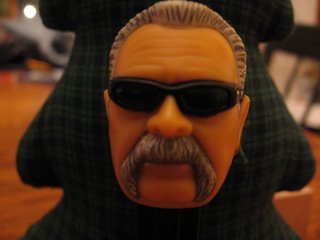Maine Baseball Hall of Fame 2004 Induction Ceremony
I was fortunate enough to attend the 2004 Induction Ceremony for the Maine Baseball Hall of Fame Sunday at the Holiday in By the Bay. Among those being honored was my father-in-law, Drig Fournier. Over 500 people were on hand to honor Drig and the nine other inductees, as well as other award winners during the four-hour ceremony.
The 2004 class was a combination of legendary town-team players, umpires, coaches and other champions of the sport - some of these gentlemen served in each of these capacities over their careers.
The Class of 2004 includes:
Al Davis, a Wilton native whose tricky knuckleball fooled hitters all over western Maine. His career spanned from 1940-59, including time in the military, where he struck out Hall of Famer Enos Slaughter.
Drig Fournier is a native of Jay who had an excellent town team career in the 1950's and 1960's. Drig led the Timber League with a .454 batting average in 1961, and reportedly finished with a career batting average over .400. Known for his heady play and knowledge of the game, Drig also served 28 years as an umpire, and is also a pretty fair golfer.
Bill Harris of South Portland spent 40 years coaching youth baseball, primarily Little League. He was recipient of the 1983 Kenneth Sills Award as Little League's Manager of the Year, and also umpired at all levels of baseball and softball.
Herb Libbey, Jr. of Mattawamkeag was another legendary town team player. "Junior" reputedly completed his four year high school career without ever having struck out, batting .400 over that time span. His town team career spanned 30 years and over 1,200 games. He was a smooth fielding first baseman and clutch power hitter. Libbey also set a new record by bringing 118 paying guests (allegedly the entire population of Mattawamkeag) to the induction ceremony.
Gene McClure was a member of the Maine Suburban Little League squad that went to the 1951 Little League World Series in Williamsport, PA. McClure's playing career included Legion ball, prep school, and the Twilight League in Southern Maine. However, it is McClure's 40+ year coaching career, which includes the 1984 Class A state championship with Deering High. McClure is currently head coach at Falmouth High School.
Jerry McConnell was honored posthumously for his umpiring career during the 1940's and 1950's. One of the top umps in the state, McConnell worked minor league games in the Downeast League and New England League, as well as games featuring barnstorming Negro League teams. McConnell's son David, who is now head usher at Hadlock Field, accepted the award.
Howard McFadden of Dennysville (way Down East) was honored for his career in the Quoddy League in Washington County. McFadden's playing career included two stints in the military (where he was named the MVP among non-professional ballplayers in Ft. Bragg, NC in 1962), and lasted until he was 51 years old! McFadden has also served as an umpire from 1988 - 2004.
Al McNeilly was honored for his playing career at the University of Maine, and for his post-playing days as a tireless champion of UMaine Sports. McNeilly earned a chemical engineering degree and spent 35 years working for Esso (later Exxon). Al recently celebrated his 60th college reunion, and showed himself to be a very gracious and humble during his remarks.
Hank Richards of South Portland was a three sport standout during his high school career in the 1950's, and he continued to star on the diamond and gridiron at both the University of Deleware and University of Maine in the early 1960's. Richards spent several years coaching both sports, but it is his long time umpiring career that earned his induction this year.
Merrill "Red" Wilson also attended the University of Maine, but his wish was to play hockey. Unfortunately for him, UMaine didn't have a hockey program in 1950. Instead, Wilson was left to play catcher, earning all Yankee Conference honors in 1951 and 1952. Wilson coached high school and played town team ball in Maine in the mid 1950's, before moving to Dennis-Yarmouth High School on Cape Cod. Red played in the Cape Cod League from 1956-62, earning the MVP award in 1961, then coached for a long time in the league, managing such future big leaguers as Craig Biggio, Kirk McCaskill and Mike Bordick. After retiring from teaching, Wilson returned to Maine to coach at Husson College.
Also honored was Max Jackson, who received the President's Award for his tireless fundraising activities to keep the Caldwell Post American Legion team alive in the 1970's. This year's scholarships were presented to Michaella Bartley of Greenville High School, Shaila Delea of Sacopee Valley, Patrick Duchette of Oak Hill, Brittany Tibbetts from Noble, Adam Vachon of Cony, and Josh Withee from Foxcroft Acadamy.
The ceremony was primarily an afternoon of stories, jokes and lies, all of which were a great deal of fun. There were some surprises, however, mostly from the irrepressible Sonny Noel. The General Chairman of the Maine Baseball Hall, Noel kept things loose with his quick wit and by bringing out both guitar and harmonica for a couple of warm up tunes. Mort Soule also provided a dramatic reading of Casey at the Bat.
The Maine Baseball Hall of Fame is a worthy organization, and Mr. Noel's energy is evident in the magnitude of the ceremony that he has put together. I am not aware of a formal museum for the Hall, nor does there appear to be a web site devoted to the Hall of Fame. Both would appear to be worthwhile ways to expand the Hall's reach, and to formally memorialize the great individuals who have contributed to the rich history of baseball in Maine.

